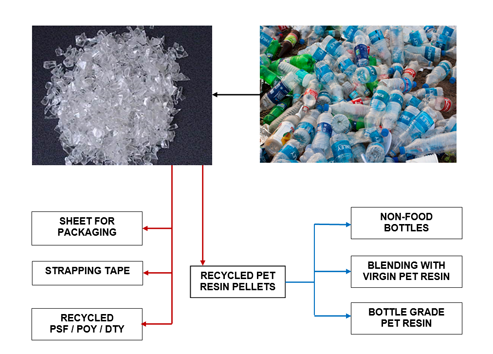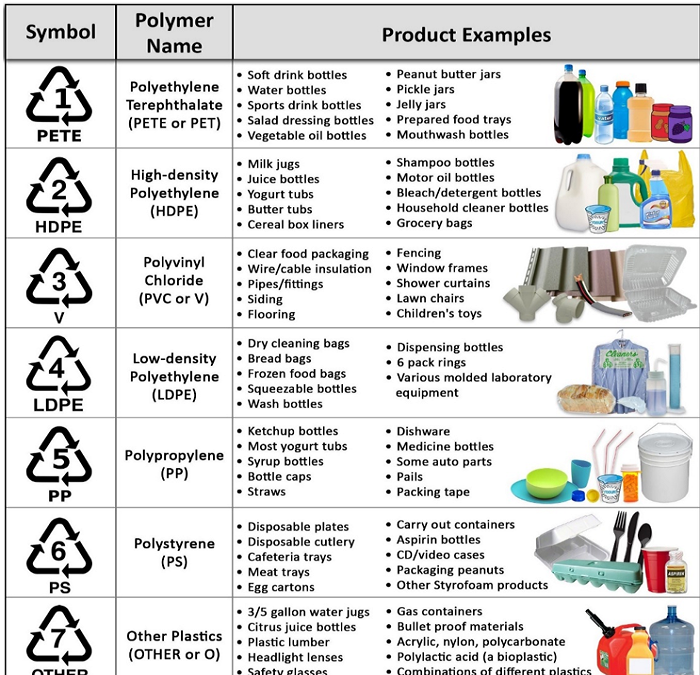
|

|

|
|
Recycling of Plastics
|
|
Food Contact Grade (US FDA approved) – Post Consumer Recycled PET
Notifications from Ministry of Environment (MoEF) and Food Safety & Standards Authority of India (FSSAI) have mandated the use of food contact approved recycled PET in new products manufactured & sold by Brand Owners (like new bottles for mineral water, carbonated beverages, juices, thermoformed food containers, PET packaging films etc.). FSSAI has also notified how to get food contact approval for the rPET resin produced by super clean process from hot washed PET bottle flakes. The production of rPET resin will grow manyfold in the future with very good business potential. There is also a lucrative export market throughout the world (due to increasing mandates by countries to use recycled content in new products).
Converting PET bottle flakes into High Grade Recycled PET Pellets resin pellets
We are a leading Technical & Project Consultancy organization actively working in the field of recycling waste PET bottles into value added products like recycled Polyester Staple Fiber (Re-PSF), recycled Partially Oriented Yarn (Re-POY) or polyester filament yarn, recycled PET extruded sheet (for thermoforming) and food grade recycled PET Resin pellets (R-PET) from post-consumer waste PET bottles. We can provide complete assistance for planning and implementation of such projects. We provide Technical Consultancy Services such as Project Feasibility Study (Technical & Commercial), preparing Project Report & carrying out Project Planning, Selection & Sourcing of plant & machinery, Plant layout design, Processing know-how, Commissioning & Trial running of plant (along with machinery suppliers), Quality Control & Testing systems, Market intelligence, Target markets & end use segments and technical advisory services. Value added products from recycled pet bottles Recycling of post-consumer waste PET Bottles 1) Recycling of Waste PET Bottles into Re-generated Polyester Staple Fiber used in production of Polyester Yarn, Fiber Fill, Non-woven Textiles (exhibition carpets, carpet backing, automotive insulation, filtration fabric, geo-textiles etc.)2) Recycled PET (rPET) pellets which are used to partially or completely replace Virgin PET resin in applications such as non-food packaging applications (bottles & containers, clear rigid sheet for thermoformed packaging), Strapping Tape etc. Solid state poly-condensation and crystallization is carried out to increase polymer intrinsic viscosity for demanding applications requiring higher physical properties. 3) Value added products like extruded Clear Rigid Sheet for Thermoformed Packaging (electronics, cosmetics, bakery etc.), Strapping Tape, Non-food contact Bottles & Containers (shampoo, hair oil, detergent, hand-wash, cleaning fluid etc.) 4) Recycled Polyester Filament Yarn (also known as polyester oriented yarn –POY) and Drawn Textured Yarn (DTY) from waste PET bottle flakes. 5) Bottle grade PET Resin (US FDA approved) from waste PET Bottles PET is one of the few thermoplastics that can be Up Cycled PET resin is highly hydrophilic i.e. readily absorbs moisture from surrounding air When PET bottles flakes are recycled (extruded) the polymer undergoes Thermal, Oxidative & Hydrolytic Degradation leading to undesirable drop in mechanical & chemical properties
What is the way out? There are various methods & technologies available. Some of them are used together in conjunction to do the job 1) Pre-drying of PET bottle flakes to reduce moisture content2) Vacuum De-gassing to remove moisture and VOCs during extrusion 3) Melt Filtration through Screens to remove agglomerates and solid contaminants 4) Adding chemicals called Chain Extenders to increase polymer IV 5) Liquid State Polycondensation (LSP) process utilizes the inherent capability of the PET polymer to condensate in the molten phase under vacuum that leads to an increase of IV. The high performance vacuum effectively decontaminates the material from harmful chemicals enabling it to be used for food contact applications. 6) Solid State Polycondensation (SSP) at elevated temperature and under vacuum of the recycled PET pellets to increase IV followed by thermal crystallization. Please find attached lecture presentation by Dr. Anomitra Chakravarty on Recycling & Upcycling of Plastic Waste delivered at a seminar organized by Institute of Industrial Development under Ministry of MSME, Govt. of India on 31st August 2019 --- in PDF format for your reference. Hope you find the presentation interesting & informative. Please click on this link to access the presentationFood Contact Grade (US FDA approved) – Post Consumer Recycled HDPE / LDPE Process is similar to that of PCR PET, however input raw material feedstock is different For PCR - HDPE it can be bottle cap regrind from the PET flakes washing process or edible oil jars. For PCR – LDPE the input feedstock can be milk pouches. The decontamination, deinking and deodorization process are the main challenges. Recycling of Commodity Thermoplastics 1) Recycled polypropylene pellets (granules) from waste PP raffia woven sacks (end-of-life), BOPP films (post industrial waste), Automotive battery / bumpers / dashboard2) Recycled high density polyethylene pellets (granules) from waste HDPE industrial drums, pipes etc. (for food contact grade using bottle caps, cooking oil jars) 3) Recycled low density polyethylene pellets (granules) from waste LDPE films (both post-consumer & post-industrial waste) for food contact grade using milk pouches 4) Recycled U-PVC pellets (granules) from waste U-PVC pipes & window profiles 5) Recycled mixed plastic waste pellets (granules) e.g. mixed PP & HDPE (separation using tribe electrostatic separation or recycling using compatibilizers) Recycling of Engineering Plastics 1) Recycled Nylon compound pellets from end-of-life carpet backing & fishing nets, post-industrial tyre cord fabric waste, post-industrial nylon filament yarn waste(We have developed and carried pilot trial of a process to remove rubber from om nylon tyre cord which is a byproduct of tyre recycling process to produce recycled Nylon 6 pellets with good mechanical properties) 2) Recycled ABS compound pellets from end-of-life white consumer goods e.g. refrigerator, washing machine, TV casings etc. 3) Compound pellets from mixed recycled ABS & PET 4) Other recycled engineering plastics like Polycarbonate (PC) and Acrylic (PMMA) (We are working on recycling process of PMMA waste into MMA monomer using pyrolysis – gasification – condensation - purification process) Recycling of Mixed Plastic Waste (MPW) and waste plastic from Municipal Solid Waste (MSW) We can provide technical know-how to recycle mixed plastic waste (e.g. mix of LDPE & PP or HDPE & PP) with the use of special additive and processing methods. Waste plastics when segregated into different streams can be easily recycled and the recycled & compounded pellets can be used to partially replace virgin plastics in non-critical applications. Where segregated plastic waste from MSW is available e.g. polyethylene carry bags, PP non-woven carry bags, flexible plastic packaging material, BOPP films, sachets etc then it is certainly possible to recycle these into value added materials. |

